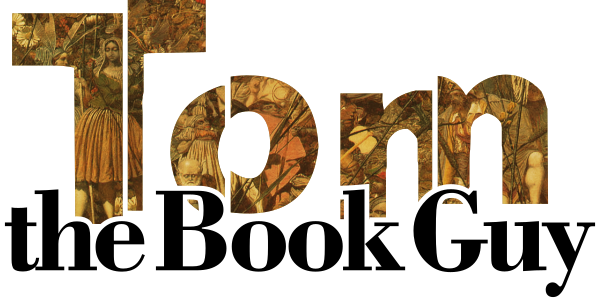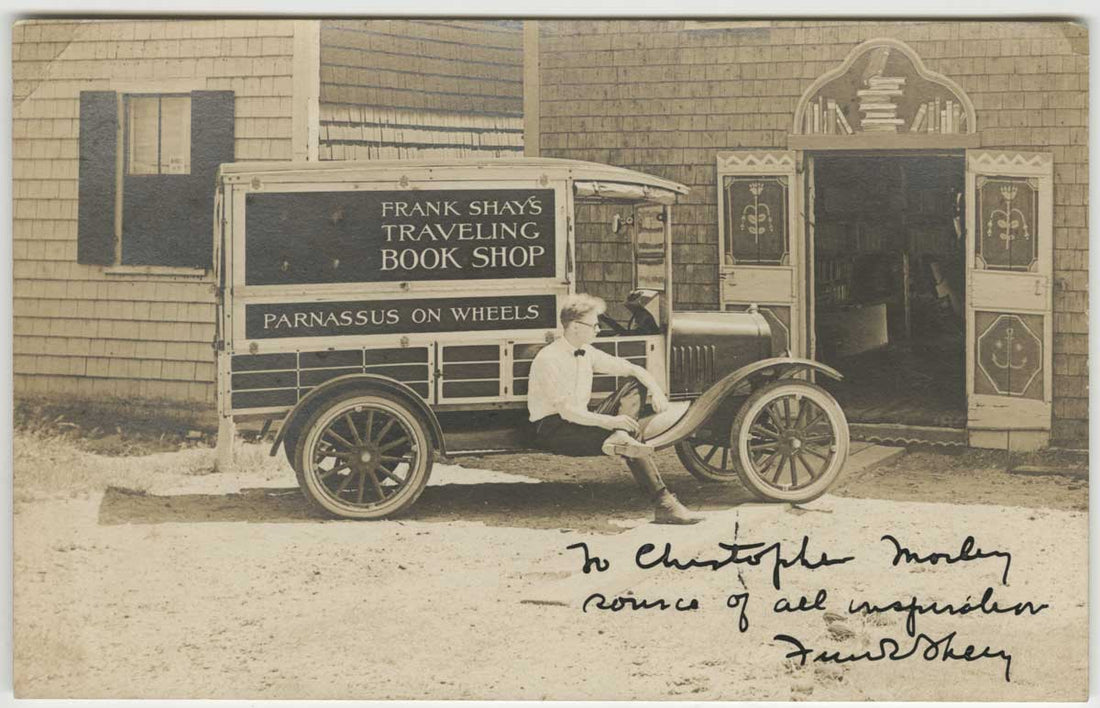Originally posted on our old blog October 2016.
The gall to suggest required reading to booksellers?
OK – let’s make it a suggested reading list for new or wannabe booksellers. Presumably established booksellers and dealers will have their own lists and defend their choices to the death. This is fine. To the less initiated, I’d like to introduce a small selection of mostly fictional books about books and the book selling business, it’s joys and complications. These are not how-tos, but rather a selection to entertain and inspire.
- The Cliff Janeway / Bookman mystery series by John Dunning. Five book series published between 1992-2006. Especially necessary if you’re a used-book seller in Denver, CO, as the author was himself a used-book seller in town for many years. These are, from one perspective, pretty typical detective/murder mysteries. But not only do they take place in my hometown of Denver, the books are all to do with the book trade. Cliff Janeway is a policeman-turned-used-book-seller. The real book trade has less murder, I promise. Theft, however, will always be an issue (though less so with an online business!).
- Parnassus on Wheels, and The Haunted Bookshop by Christopher Morley. I’ve only just started reading Parnassus, published in 1917, about a horse-drawn bookshop in New England. How great is that?! It’s short, light, and I look forward to spending some time with Helen McGill and Mr Mifflin on their adventures. In the past 100 years, the book trade has apparently not changed a bit in some respects, and changed completely in others. Country folk still don’t have ready access to brick-and-mortar bookstores, and publishers still weep over used book prices. Both books are in the public domain – Parnassus and Haunted. Physical copies are also currently available in our eBay store.
- 84, Charing Cross Road by Helene Hanff. Another charming, quick read. Non-fiction, published in 1970, of a twenty year correspondence between Ms Hanff in New York, and the booksellers of Marks & Co., in London. Fed up with her inability to find the books she wants in New York city, she writes to Marks & Co, care of Frank Doel, and finds friendship as well as many of the books she seeks. Also interesting in that England was still dealing with rationing, and Helene is able on a few occasions to send food-stuffs that were otherwise unavailable or too expensive in England at the time. Sadly, according to wikipedia, the store itself is no more and the location is now a McDonald’s. Figures.
- The Thursday Next series by Jasper Fforde. Flat-out insanity from page 1 all the way to the end of book 7. Fforde has a defiantly particular brand of genius, but it is also accurate to put him right beside Terry Pratchett and Douglas Adams in terms of absurdist hilarity. Fforde possibly outdoes them both in terms of unlikely inventiveness that, in the context of the story, you can’t help but accept regardless of how utterly bonkers the premise. He stands alone in terms of literary nerdery, peppering his novels with bookish in-jokes... 85% or so probably flew right over my head, but that’s just fine. And I realize I haven’t actually explained what this series is about. Ummmm. Thursday Next, our heroine, is a literary detective in an alternate 1980s UK in a world absolutely obsessed with literature, and people can actually travel into the world of fiction and interact with the characters behind the scenes (that can be weirdly quasi-meta). Thursday eventually joins the police force in the bookish world, known as “Jurisfiction”. But this only scratches the surface. Read ’em and weep (with laughter).
- Mr Penumbra’s 24-Hour Bookstore by Robin Sloan. A recent novel (2012), combining the age-old activity of book investigation/decryption (taken to the level of an entire secret society devoted to unraveling a centuries-old mystery), and the techno-nerdiness of Silicon Valley. I read Lev Grossman’s Codex shortly after finishing Mr Penumbra’s – not a bad follow up, as it also involves a huge dose of bookish conspiracy. Neither book could be considered high art, but they should absolutely satisfy on a cold autumn’s evening.
- The City of Dreaming Books by Walter Moers. 2006. A German author, I thank the heavens Moers’ books have been popular enough for English translations. Taking place in his world of Zamonia, City of Dreaming Books follows our hero, Optimus Yarnspinner (a dinosaur – I should warn you Moers’ books are, similar to Fforde, uniquely peculiar), as he travels to Bookholm with a mysterious manuscript. Bookholm is the hub of the the book trade in Zamonia and is literally built with book-and-mortar. Walter Moers is also an accomplished illustrator, and uses it to great effect. Without his illustrations, it would be hard to remember that most of the characters are far from human.
Have I forgotten any? Of course I have. Look on Goodreads or any other bookish website, and you’ll find exhaustive lists of books on bookishness, both fiction and non-fiction. I err towards fiction, but there are dozens of non-fiction books about the book trade that I really, really, should get around to. The reason I suggest these books to booksellers is that book selling, like any business, can potentially become tedious and focused on finances – just look at Amazon, the epitome of lifeless bookselling (I prefer eBay, but would lovelovelove to have a brick-and-mortar store). [2023 addendum: having this website to sell directly through has partly scratched that itch: we now have our own little corner bookshop of the internet!] The books above can help remind you of the joys and creativity to be had in the business.
header photo found here. Caption: "A postcard from Frank Shay to Christopher Morley showing Parnassus on Wheels, ca. 1921. Christopher Morley Collection, Recip: Sf-Shd."

